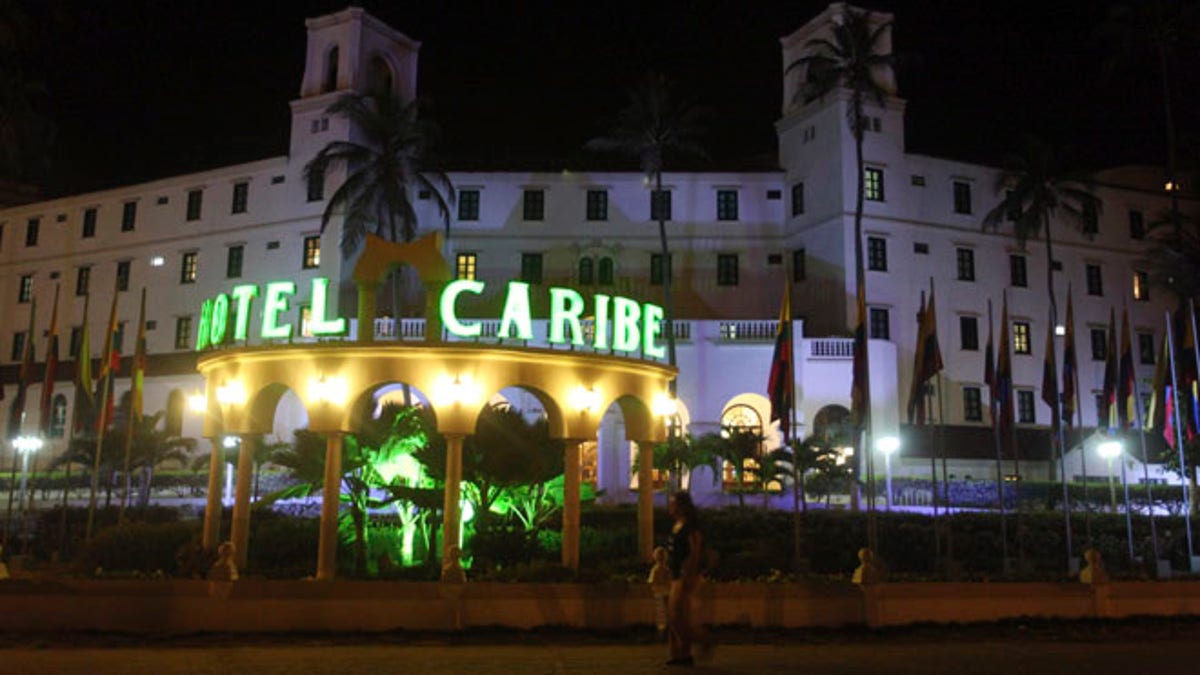
April 19, 2012: People walk past Hotel El Caribe in Cartagena, Colombia -- where Secret Service agents allegedly brought prostitutes ahead of President Obama's visit. (AP)
Secret Service agents involved in the recent prostitution scandal apparently paid nine of the 12 women they picked up, though none were tied to any terror group or other nefarious organization, according to an internal account sent to a top lawmaker.
Rep. Peter King, R-N.Y., chairman of the House Homeland Security Committee, confirmed details to Fox News of a written response sent from the Secret Service to the congressional committee which is investigating the scandal last month in Cartagena, Colombia.
King said a total of 10 women have been questioned, with nine of them apparently claiming they were paid as prostitutes by the agents.
The Secret Service has declined to comment on the details, first reported by The Washington Post.
The information came in response to 50 questions King sent the Secret Service after the scandal erupted last month. Other House and Senate committees also are seeking information, including the timeline of the events in Cartagena, Colombia, and details about allegations in other cities and whether the Secret Service culture permitted or encouraged such behavior.
Homeland Security Secretary Janet Napolitano told The Associated Press in New Zealand, where she was visiting, that the Secret Service has found no basis to allegations its agents hired strippers and prostitutes in El Salvador last year.
The Secret Service has issued only limited public statements since the April 12 incident in Cartagena, which implicated a dozen agents, officers and supervisors and 12 other U.S. military personnel in a night of heavy drinking in Cartagena before President Obama's visit to the Summit of the Americas. Some were accused of bringing prostitutes back to their hotel rooms.
The Secret Service has forced eight employees from their jobs and was seeking to revoke the security clearance of another employee, which would effectively force him to resign. Three others have been cleared of serious wrongdoing. The military was conducting its own, separate investigation but canceled the security clearances of all 12 enlisted personnel.
Senate Armed Services Committee Chairman Carl Levin, D-Mich., told reporters last week that he expects the Pentagon investigation to wrap up this week and had scheduled a briefing on its findings on Tuesday.
But the president's elite protective agency has drawn the most scrutiny, and Sullivan has labored to answer lawmakers' questions in many cases before they are asked. On Friday, the Secret Service announced that a chaperone would travel on all overseas trips, alcohol consumption was prohibited 10 hours before shifts and that foreign nationals were not permitted in hotel rooms.
The inspector general for the Homeland Security Department has launched an investigation into whether classified information was compromised during the Cartagena incident, as well as examining whether Secret Service has a "cultural problem" where such behavior has been tolerated by the head office, according to two congressional staffers who were briefed on the investigation. The process is expected to take about a year.
In addition, reports of two other incidents resurfaced related to questionable or criminal behavior by Secret Service employees.
A week before the Winter Olympics began in Utah in 2002, three Secret Service agents allegedly met three college girls and days later took them back to their hotel, got them drunk, then carried out two sexual assaults, according the Herald Mail newspaper in Utah.
The other incident allegedly occurred in February 2002 in Encinitas, Calif, and involved Secret Service agents trailing then-Vice President Dick Cheney.
The incident occurred outside a bar at closing time when an agent allegedly made sexually suggestive remarks to a woman. The boyfriend of the woman and the agent exchanged words, then the agent grabbed him and bit his ear, taking off a piece. No criminal charges were filed, and the agent said during a civil case that the boyfriend tugged at his gun in the struggle, according to KGTV in San Diego.
The Secret Service said the incidents were covered extensively in the media when they occurred more than 10 years ago and that the agency responded at that time.
The Associated Press contributed to this report.




